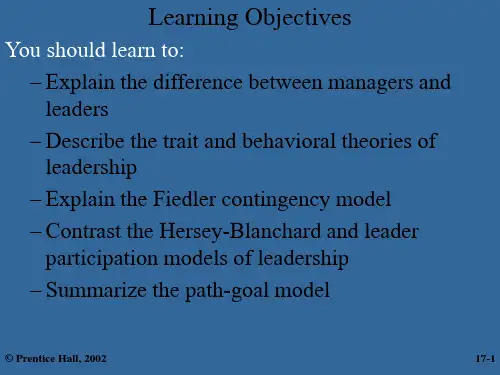管理学英语课件正式计划
- 格式:ppt
- 大小:2.99 MB
- 文档页数:13
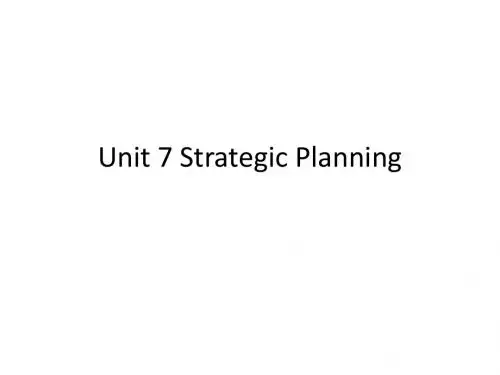


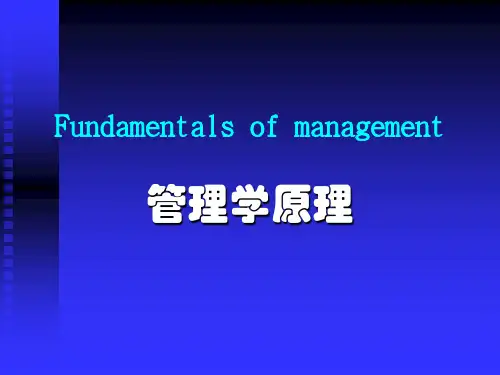

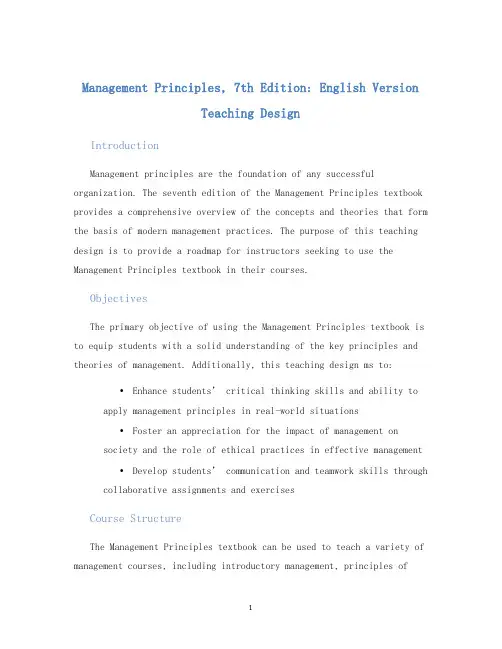
Management Principles, 7th Edition: English VersionTeaching DesignIntroductionManagement principles are the foundation of any successful organization. The seventh edition of the Management Principles textbook provides a comprehensive overview of the concepts and theories that form the basis of modern management practices. The purpose of this teaching design is to provide a roadmap for instructors seeking to use the Management Principles textbook in their courses.ObjectivesThe primary objective of using the Management Principles textbook is to equip students with a solid understanding of the key principles and theories of management. Additionally, this teaching design ms to: •Enhance students’ critical thinking skills and ability to apply management principles in real-world situations•Foster an appreciation for the impact of management on society and the role of ethical practices in effective management •Develop students’ communication and teamwork skills through collaborative assignments and exercisesCourse StructureThe Management Principles textbook can be used to teach a variety of management courses, including introductory management, principles ofmanagement, and organizational behavior. The following outline provides a suggested course structure:Week 1-2: Introduction to Management PrinciplesThe first two weeks of the course will provide a broad overview of the field of management, including the historical evolution of management practices, the functions of management, and the key concepts and theories of management.Week 3-4: Planning and Decision MakingDuring this module, students will learn about the importance of planning and decision-making in effective management. Topics coveredwill include the various types of planning, the decision-making process, and the role of risk management in decision-making.Week 5-6: Organizing and LeadingStudents will explore the role of organizing and leading ineffective management. Topics covered will include the principles of organizational design, leadership styles and strategies, and the importance of team dynamics in achieving organizational goals.Week 7-8: Controlling and EvaluatingDuring this module, students will learn about the importance of controlling and evaluating in effective management. Topics covered will include the functions of control, the use of performance metrics, and the role of feedback in evaluating organizational performance.Week 9-10: Contemporary Issues in ManagementIn this module, students will explore contemporary issues in management, including the challenges of managing in a global environment, the impact of diversity on organizational performance, and the role of sustnability in effective management.Week 11-12: Ethics in ManagementDuring the final module, students will examine the role of ethics in effective management. Topics covered will include the importance of ethical decision-making, the impact of corporate social responsibilityon organizational performance, and the challenges of managing ethical dilemmas in the workplace.Teaching MethodsTo enhance students’ understanding and retention of the material covered in the Management Principles textbook, a variety of teaching methods can be employed, including:•Lectures: Use lectures to present key concepts and theories, providing examples to illustrate the practical applications ofmanagement principles.•Classroom discussions: Encourage students to participate in classroom discussions, allowing them to share their thoughts andperspectives on management topics and engage in critical thinkingexercises.•Case studies: Use case studies to provide real-world examples of management problems and solutions, giving students the opportunity to apply management principles to practical situations.•Group projects: Assign group projects to promotecollaboration and teamwork, allowing students to develop theircommunication and leadership skills while exploring managementprinciples.•Exams and quizzes: Use exams and quizzes to assess students’ understanding of the material covered in the textbook.ConclusionThe Management Principles, 7th Edition textbook provides a comprehensive overview of the key concepts and theories of management.By utilizing this teaching design and employing a variety of teaching methods, instructors can enhance students’ understanding andappreciation of management principles, while developing their critical thinking and communication skills.。
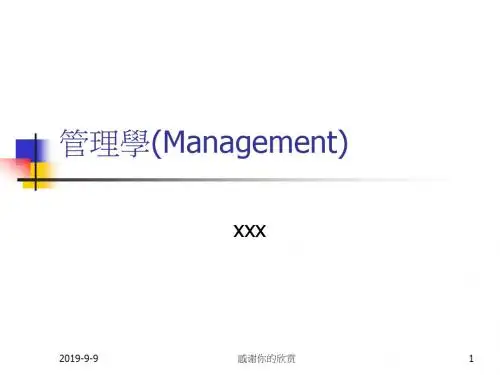


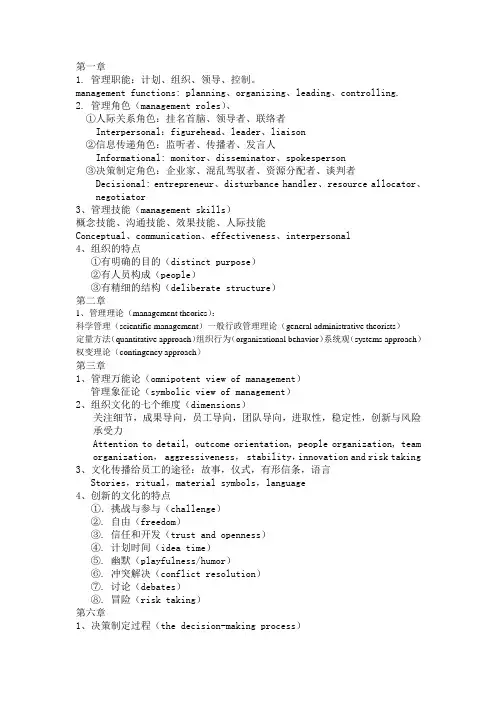
第一章1.管理职能:计划、组织、领导、控制。
management functions: planning、organizing、leading、controlling.2.管理角色(management roles)、①人际关系角色:挂名首脑、领导者、联络者Interpersonal:figurehead、leader、liaison②信息传递角色:监听者、传播者、发言人Informational: monitor、disseminator、spokesperson③决策制定角色:企业家、混乱驾驭者、资源分配者、谈判者Decisional: entrepreneur、disturbance handler、resource allocator、negotiator3、管理技能(management skills)概念技能、沟通技能、效果技能、人际技能Conceptual、communication、effectiveness、interpersonal4、组织的特点①有明确的目的(distinct purpose)②有人员构成(people)③有精细的结构(deliberate structure)第二章1、管理理论(management theories):科学管理(scientific management)一般行政管理理论(general administrative theorists)定量方法(quantitative approach)组织行为(organizational behavior)系统观(systems approach)权变理论(contingency approach)第三章1、管理万能论(omnipotent view of management)管理象征论(symbolic view of management)2、组织文化的七个维度(dimensions)关注细节,成果导向,员工导向,团队导向,进取性,稳定性,创新与风险承受力Attention to detail, outcome orientation, people organization, team organization, aggressiveness, stability,innovation and risk taking 3、文化传播给员工的途径:故事,仪式,有形信条,语言Stories,ritual,material symbols,language4、创新的文化的特点①.挑战与参与(challenge)②. 自由(freedom)③. 信任和开发(trust and openness)④. 计划时间(idea time)⑤. 幽默(playfulness/humor)⑥. 冲突解决(conflict resolution)⑦. 讨论(debates)⑧. 冒险(risk taking)第六章1、决策制定过程(the decision-making process)①.识别决策问题(identification of a problem)②.确定决策标准(identification of decision criteria)③.为决策标准分配权重(allocation of weight to criteria)④.开发备份方案(development of alternatives)⑤.分析备份方案(analysis of alternatives)⑥.选择备择方案(selection of an alternatives)⑦.实施备择方案(implementation of the alternatives)⑧.评估决策结果(evaluating decision effectiveness)2、决策制定的错误(decision-making errors and biases):自负(overconfidence)后见(hindsight)自利型(self-serving)沉没成本(sunk costs)随机性(randomness)典型性(representation)有效性(availability)框架效应(framing)证实(confirmation)选择性认知(selective perception)锚定效应(anchoring effect)即时满足(immediate gratification)4、计划工作(planning):①、定义组织目的(defining the organization’s goals)②、制定全局战略(establishing an overall strategy)③、开发一组广泛的相关计划(developing plans)5、计划的目的(purposes of planning):①、它给出了管理者和非管理者努力的方向(planning provides direction to managers and nonmanagers alike)②、它通过迫使管理者具有前瞻性来降低不确定性(planning reduce uncertainty by forcing managers to look ahead, anticipate change, consider the impact of change, and develop appropriate responses)③、计划可以减少活动的重复和浪费(planning minimizes waste and redundancy)④、计划设定目标和标准,可以用于控制(planning establishes the goals or standards used in controlling)6、计划和绩效(planning and performance)①正式的计划工作通常带来较高的绩效、较高的资产回报率,以及其他积极的财富Formal planning is associated with positive financial results such as higher profits, higher return on assets, and so forth.②计划工作的质量以及实现计划的适当措施,通常要比计划工作本身对绩效的贡献更大Doing a good job of planning and implementing those plans play a bigger part in high performance than does the extent and amount of planning done.③正式计划并不必然的导致至高绩效,外部环境的影响通常是更关键的Formal planning didn’t lead to higher performance, the external environment often was the culprit.④计划与绩效的关系还受到计划时间结构的影响。
